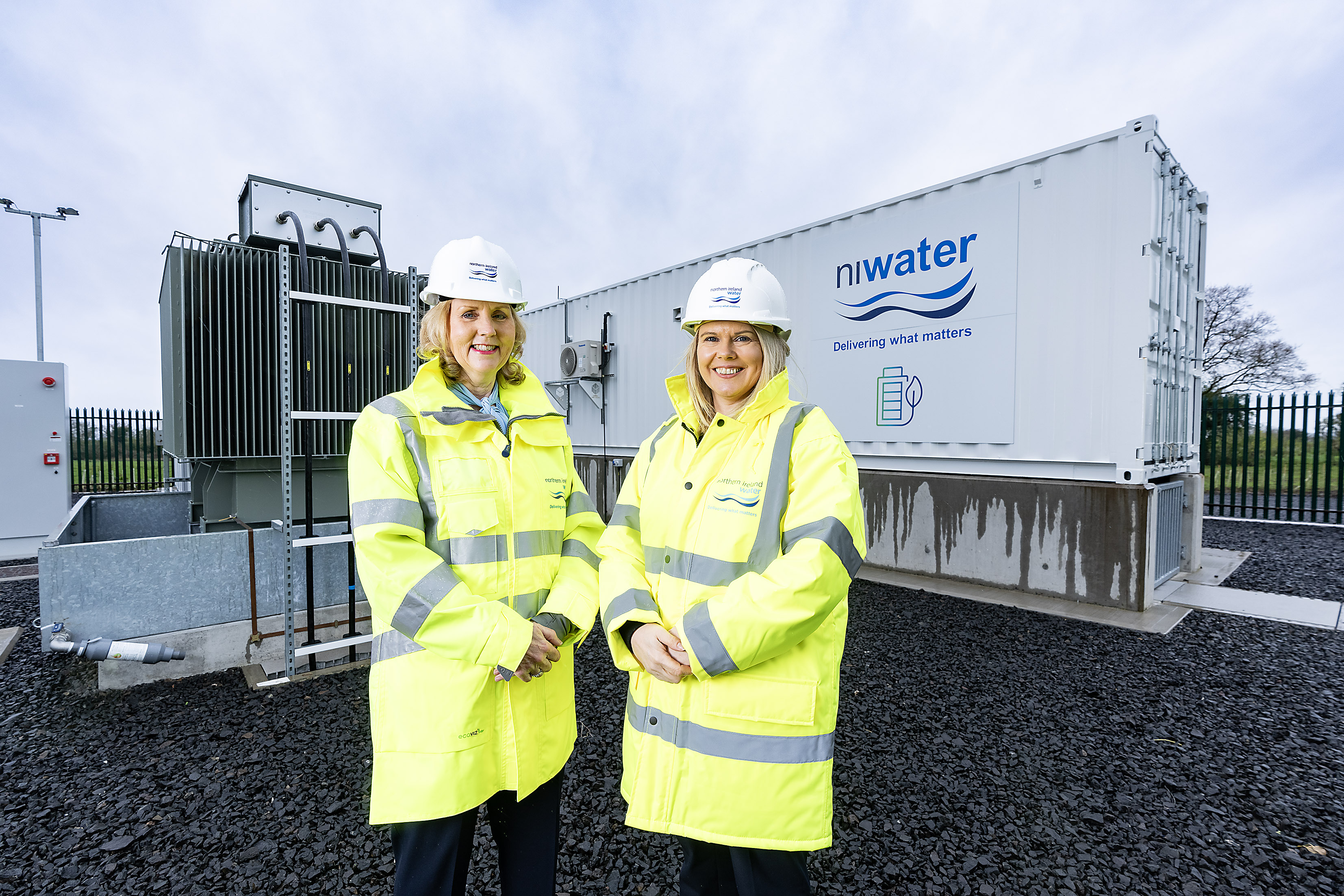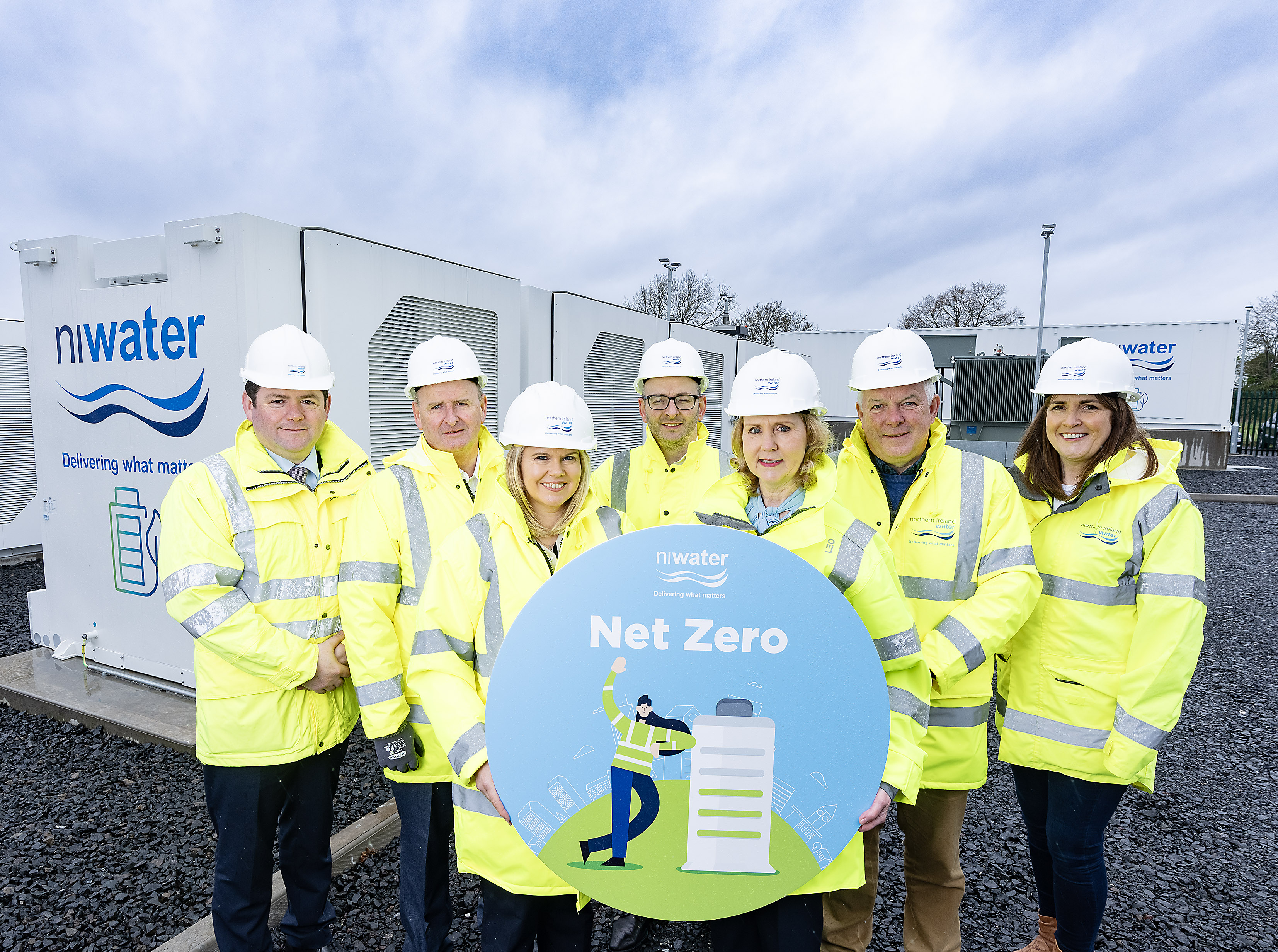Learn more about our Climate Change Strategy
Read bookletNI Water is set to reduce its carbon footprint after becoming one of the first public sector organisation’s to install a state-of-the-art battery energy storage system. The 4.1 MW battery is powered by an existing solar farm at one of NI Water’s largest water treatment plants, Dunore Point, Antrim.
The battery boasts a 5.6 MWh (megawatt hour) total capacity which helps to store surplus energy generated onsite from c.24,000 solar panels. The battery means that during periods of low customer demand, NI Water can store this surplus renewable energy to use later during peak times. The company can therefore power its operations at a lower cost and keep water flowing.
The battery also has flexibility to provide power back to the grid when required, to help support grid stability and provide greater resilience in the network to benefit NI society and economy. By generating its own renewable power, NI Water will reduce its costs and generate income from this installation.
Jo Aston, Chair at NI Water, said: “NI Water’s Power of Water Report outlined practical examples of how NI Water planned to play a pivotal role in decarboinising our energy system. This Dunore Point project is just one of the many initiatives we committed to in this Report. It is great to see tangible results on the ground through the deployment of a state-of-the-art battery energy storage system.
“The large-scale battery will provide greater resilience for both NI Water and the wider network across Northern Ireland. It will store renewable energy generated onsite, avoiding peak tariffs, and enable more capacity for renewables to be connected to the grid. We will be able to provide electricity system services to the national grid operator which in turn has the potential to generate income for NI Water and help offset other costs.”
Infrastructure Minister John O’Dowd said: “I commend NI Water for their progressive action in becoming one of the first public sector companies to install this state-of-the-art battery energy storage system. This will reduce carbon emissions and generate income for NI Water – good for the environment and makes sound economic sense.
This is exactly the type of vision and action that is needed to help reduce our carbon footprint and tackle climate change.
“Helping to reduce the impact Climate change presents challenges for all of us, but there are big opportunities too. We have the knowledge and the expertise to not only deal with those challenges but to take forward projects and initiatives which will change things for the better. This is a prime example and I congratulate NI Water for leading the way and setting an example for other businesses.”
Jo Aston, Chair at NI Water, continued: “NI Water is committed to achieving net zero for the energy it uses by 2030. This is not simply an aspiration; it is a goal we have set ourselves and one that we are working toward achieving. We are all living with the effects of climate change now, we have seen the impact of hotter, drier summers and increasingly wet winters. This project highlights how NI Water, as the biggest user of energy in Northern Ireland can play a strategically important role in building the green economy and delivering a climate resilient future for our customers.
“This innovative project was complex and challenging however, it was delivered by working collaboratively with locally based suppliers including Arup and GRAHAM. Working closely with the Department for Infrastructure, Department for Economy and key stakeholders from NIE Networks, SONI and others, we are continuing to play a pivotal role in supporting renewable growth and helping to decarbonise our local economy.”
Economy Minister Conor Murphy said: “Projects such as this are key to helping us move towards net zero which is a key objective of my economic vision. This is a great example of how we can work together to deliver against policy objectives contained in the Executive’s Energy Strategy and showcases government leadership in energy decarbonisation.
“The delivery of this project is part of the wider central government ‘Energy Invest to Save’ initiative that is now entering into its fourth year with £45m delivered across over 100 projects delivered to date.”
The news comes after the Department for the Economy recently published its Energy Strategy Action Plan for 2024 as the department continue to lead the delivery of the Executive’s Energy Strategy. The new NI Water battery is a great example of cross collaboration funded by the Department of Economy (DfE) at a cost of £7.9 million as part of a central government investment initiative.
Ends
Caption for photo: The state-of-the-art battery which has been delivered to one of NI Water’s largest water treatment plants at Dunore Point. The battery helps to store surplus energy generated onsite from 24,000 solar panels to power its operations at peak times to reduce costs. It also has the flexibility to provide power back to the grid when required, to help support grid stability and provide greater resilience in the network to benefit NI society and economy. Pictured is NI Water Chair Jo Aston and NI Water Chief Executive Dr Sara Venning who praise the scheme saying it will help NI Water work towards its target of 100% renewable electricity by 2030.
Captions for all photos (Pictured L-R):

Jo Aston, Chair at NI Water and Dr Sara Venning, CEO at NI Water.

John Green, Strategic Investment Board; Dr Sara Venning, CEO at NI Water; Ryan White, Department for Economy; Jo Aston, Chair at NI Water; and Alistair Jinks, Director of Business Services at NI Water.

Damien O’Mullan, Head of Energy at NI Water; John Green, Strategic Investment Board; Dr Sara Venning, CEO at NI Water; Ryan White, Department for Economy; Jo Aston, Chair at NI Water; Alistair Jinks, Director of Business Services at NI Water; and Stephanie McCullagh, Director of Customer and Operations at NI Water.
Links to videos and further content:
- Jo Aston, Chair at NI Water explains the benefits of our new state-of-the-art battery energy storage system at Dunore Point. The battery helps to store surplus energy generated onsite from 24,000 solar panels. This means that during periods of low customer demand, we can store this renewable energy to use later during peak times. Therefore, we can power our operations at a lower cost and keep water flowing. The video is available to here (40 secs long): https://youtu.be/XrU5mDqIw2w
- A full video overview is also available here (2 mins long): https://youtu.be/uPMX9CpqSwE
Notes to editors
- NI Water is committed to achieving net zero for all emissions by 2040 and net zero for the energy it uses by 2030.
- Battery energy storage systems (BESS) store renewable energy when demand is low and release it at times of high demand, helping to keep costs down and electricity flowing. BESS also provide demand response which helps to balance electricity supply and demand to support grid stability and generate revenue.
- The battery was funded by the Department for Economy (DfE) at a cost of £7.9m.
- The battery energy storage system has 4.1 MW rated power with 5.6MWh total capacity.
- For further information please visit: www.niwater.com/climatechange
Media enquiries to the NI Water Press Office via email to press.office@niwater.com